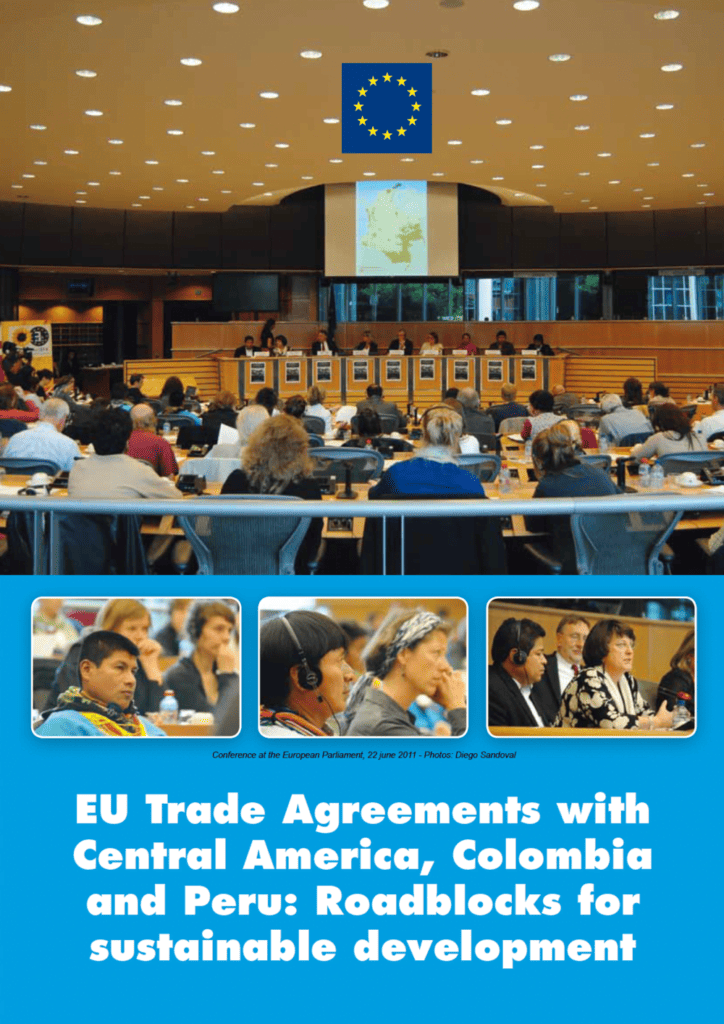This analysis, penned in 2011, delves into EU trade agreements with Peru and Colombia, and a bilateral agreement with several Central American countries. It raises concerns about human rights, sustainable development, market access, and economic implications, among other factors.
Even today, the analysis remains relevant, offering insights into the enduring complexities surrounding international trade agreements and their implications on various socio-economic fronts, including human rights, environmental protection, and economic development.
Summary
During the second half of 2011, the free trade agreement (FTA) between the European Union (EU) and Colombia and Peru, and the Association Agreement (AA) between the EU and Central America (CA), are expected to be presented by the European Commission to the Council and the European Parliament (EP). This will be the first time during the entire 4-year negotiation process that the EP can see and analyse the text, yet it cannot change or modify the agreements. It gives its consent by simple majority on a “take it or leave it” basis.
The EU-CA AA contains three pillars: political dialogue, cooperation, and trade. However, as the two regions already signed an agreement on political dialogue and cooperation in 2003, the trade pillar (free trade agreement) constitutes the principal change in the bi-regional relations. The EU agreement with Colombia and Peru is a Multi-Party Trade Agreement that also includes political clauses.
Sustainability flaws in EU trade agreements
Trade is important and necessary, and could be a means to promote sustainable development. However, we strongly believe that the trade agreements negotiated do not meet their overall objectives to contribute to sustainable development and poverty reduction, but instead, risk doing the opposite. The agreements disregard the asymmetries in development levels between the EU on the one hand and CA, Peru, and Colombia on the other.
These concerns are shared by many civil society networks, organisations, academics, trade unions, and social movements around the world, especially in Latin America and Europe. The European Parliament needs to conduct a profound and inclusive discussion on the implications of these agreements, to ensure effective democratic control. This paper offers elements for consideration during this democratic debate.
Key findings
The analysis highlights several key findings regarding the EU’s trade agreements with Central American countries, Peru, and Colombia:
Human Rights and Sustainable Development
The agreements inhibit the development of national policies aimed at human rights and sustainable development, as they lack mechanisms to ensure the effective implementation of core conventions on human rights, labour rights, and environmental standards. This absence makes it impossible for the EU to enforce sanctions based on non-compliance.Market Access and Local Economies
The agreements grant the EU extensive market access, reducing the ability of Central American and Andean countries to favour local producers. This limitation affects government procurement policies aimed at stimulating the local economy and industries.Services Sector
EU services suppliers gain equal access to local markets, hindering the support for local services suppliers and intra-regional trade.Financial Sector Liberalisation
The EU pushes for further liberalisation of the financial sector, despite predictions of negative impacts on financial services industries and job loss in Central America, Colombia, and Peru.Tariff Policy
: The agreements restrict the flexibility of tariffs, preventing their use as a crucial tool for agricultural and industrial policies.Intellectual Property Rights
Inadequate mechanisms are included to prevent improper appropriation of genetic resources or traditional knowledge through Intellectual Property Rights, potentially harming local communities.Dependency on Raw Materials
The agreements foster dependency on exports of raw materials, hindering economic diversification and sustainable development.Impact on Vulnerable Groups
Increased competition for land and water resources exacerbates social conflicts and threatens the rights of indigenous peoples, afro-descendants, and subsistence farmers.Economic Implications
Real wages are expected to decrease, while imports may rise more than exports, negatively affecting trade balance and reserves, and increasing external debt.Shift in Development Priorities
Development cooperation priorities shift towards export-oriented economic growth, potentially reducing support for democracy, human rights, and social development.Civil Society Participation
There’s a need for effective mechanisms for civil society participation and monitoring to ensure transparency and accountability in the implementation of the agreements.
Overall, the findings suggest that the trade agreements may hinder sustainable development, exacerbate social inequalities, and prioritise economic interests over human rights and environmental protection.
